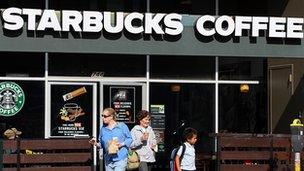Why small details matter for big firms
- Published
IHG executive Jan Smits learned about the details that go into the turndown service
Jan Smits is standing in his hotel room staring at his watch and he's not very happy.
But Mr Smits is no ordinary guest. He's the Asia, Middle East and Africa chief executive of Intercontinental Hotels Group (IHG), the world's largest hotel chain.
On a trip to India to see how young graduates are trained within the company he has just realised that the time taken to prepare the hotel rooms for bedtime - the so-called turndown service - is not standardised.
At the Crowne Plaza New Delhi Rohini the process of turning down the duvet cover and closing the curtains took five minutes, but it should only take two minutes.
It seems surprising that someone so senior, a member of the firm's executive committee, is concerned about this kind of small detail which one would assume would fall squarely under the remit of housekeeping.
But for IHG, like all businesses, time equals money. If a regular process such as this takes longer than it should, then repeated 678,000 times for each of its rooms worldwide, the extra time spent would be significant and ultimately costly.
But it's not only crucial for financial reasons, but so that a guest, whether they are staying at a Crowne Plaza in India or America, has the same experience each time.
Mr Smits says IHG uses so-called "standard operating procedures" to ensure this level of standardisation. These outline every single step involved in any regular process, such as a turndown or checking a guest into the hotel, to ensure it is both efficient and consistently creates the same end result.
"From my experience here tonight there's just a little bit more room to make sure it's exactly the same across all the Crowne Plazas. We're very close but it can't be very close. it needs to be the same each time to create a great brand," he says.
Focus on the detail
While it may appear obsessive, experts argue paying attention to these kinds of details is not only important, but is a crucial part of a firm's success, particularly customer-facing ones.
That's because creating a standard and consistent experience can be a good way of making customers loyal to a particular brand.
"Ultimately it drives customer loyalty and repeat business. As long as it's an enjoyable experience people tend to go to what they know even when they're in another country," says Bridget McVerry, a principal at management consultancy Oliver Wyman where she focuses on the retail sector.
She points to fast food chain McDonald's as an example. "You know what you're going to get and not just from a product point of view, but from the overall experience," she says.
Recent research by Oliver Wyman in the US found that differences in customer experience were the reason behind one quarter to one third of the variation in sales and profits of individual shops within a chain. Improving the consistency of the customer experience drove sales improvements of 10% or more.
And it's not just a good way of creating loyal customers, it can help create loyal employees: retail chains which focused on providing a consistent customer experience - where employees knew what they were supposed to do and were given the training and tools to do it - had staff turnover rates 50% or more below industry norms.

McDonald's customers know what experience to expect
Given the very real difference the research shows that focusing on the customer experience can have, Ms McVerry believes that it's something chief executives should be involved with, at least initially in terms of defining what she calls their "mantra'"- the experience that the business wants to deliver to its customers.
Of course, the more branches a firm has the harder it can be to ensure customers have the same experience each time they visit.
Values come first
Coffee chain Starbucks has more than 19,000 stores worldwide, including 730 in the UK, and while Ian Cranna, vice president of marketing at Starbucks UK, admits that being consistent can be hard, he says customer feedback indicates it is important.
"One of the things they value most about Starbucks is the friendly, personal service and the consistent high quality coffee. They are just not willing to take a risk on a poor experience or product when they have just a few moments on their morning commute or school run," he tells the BBC.

All new Starbucks staff are trained in its cultures and values
To ensure that customers' experiences are the same, whether they order their coffee in London or Manchester, Mr Cranna says all new Starbucks staff are trained in its cultures and values before they are let anywhere near a coffee machine. These cultures and values - which include making the coffee shops a "third place" for customers away from home and work - are the same in each of the 60 countries in which it operates.
"The culture and values are fundamentally important, with straightforward functional training alone it would be very hard to maintain the high quality consistent experience we strive to offer," he says.
As IHG's Mr Smits says: "The devil is in the detail. You have to be very disciplined and empower your leaders to make it happen."
Escape from the Boardroom is a five-part series broadcast on BBC World News on Saturdays at 02:10 and 15:10, and Sundays at 09:10 and 21:10 (all times GMT).
- Published4 October 2013
- Published27 September 2013
- Published20 September 2013